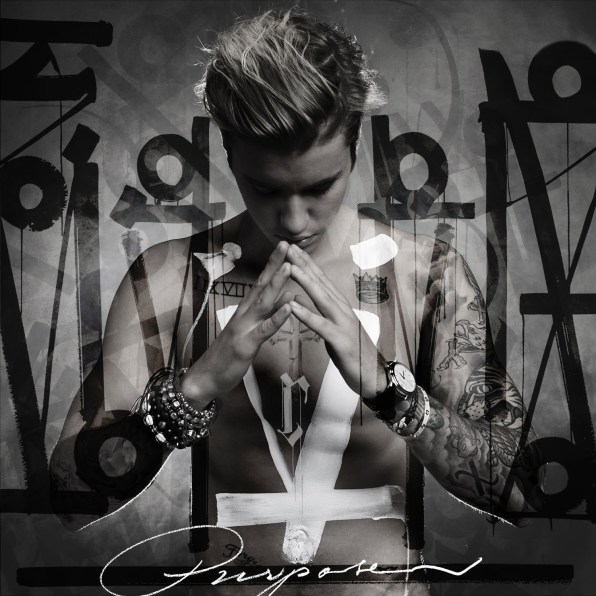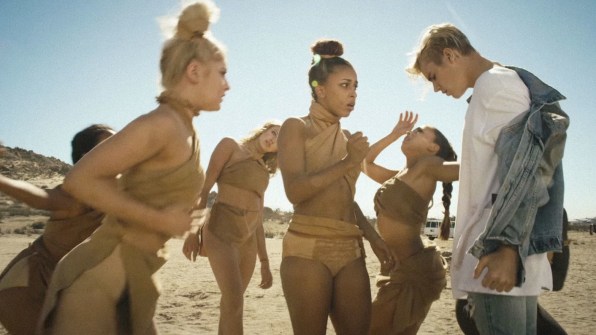“You could’ve been an inspiration to the world,” Morgan Freeman tells a talking teddy bear in Ted 2. (It’s that kind of movie.) “You could’ve been a leader, a role model. Instead, you’re… Justin Bieber.” The bear responds to this charge as though it were a Holly Holm power-kick to the jaw. “Fuck you!” he roars, bear-like. The only problem with this jokey reaction is that it was already dated when the movie debuted to unspectacular box office this summer. By mid-2015, likening someone to Justin Bieber had become less of an insult than ever before. And the year was only halfway through.

Following a long stretch of terrible publicity, Justin Bieber has emerged in 2015 as a non-guilty pleasure. It hasn’t necessarily become a good look to be a dyed-in-the-wool Belieber, but that level of fandom is at least far more interesting and understandable than staunch Bieber-hatred, which now comes across as tone-deaf and uninformed. It all happened relatively fast too.
Few people have ever had a public approval turnaround as swift and thorough as the one Justin Bieber enjoyed this year. Usually, these things go the other way. Iggy Azalea’s 2015, for instance, was like the scorching, barf-filled hangover following the rager that was 2014—except it’s a hangover from which she may never recover. (Robin Thicke had the exact same year the previous year.) What’s interesting about Bieber’s transformation, however, is that it was orchestrated and executed with Orwellian precision, in a manner that was so transparent you could practically see his publicity team’s expense account receipts. It shouldn’t have worked. At one point, Hannibal Buress hoped out loud that it wouldn’t. But it did.

When I first heard of Justin Bieber back in 2010, I regarded the budding Canadian YouTube sensation the same way everybody else born in Reagan’s first administration did. He was an object of ridicule. Regardless of how far removed I was from the intended audience, and how redundant any cultural criticism I brought to bear on him might be, I knew the song “Baby” was objectively bad and I didn’t need to actually hear it before making fun of the baby chipmunk from whence it came. For a couple of years, this was how it went. Justin Bieber sold a hilarious amount of albums and people like me used him as shorthand for “indefensible garbage” in pop culture japery. Then something happened.
If you don’t like what people are saying about you, Don Draper frequently advised on Mad Men, change the conversation. It’s something every young artist struggles with when they first start to emphasize the ‘artist’ part over the youngness. Think of Miley Cyrus becoming a pan𝑠e𝑥ual pot juggalo in an effort to make sure the first thing you think of when you think of her doesn’t rhyme with “Shanna Fontana.”
For Justin Bieber, this new phase was marked by a similar descent into the wilderness, albeit one with less twerking. After 2012, Bieber stopped making albums and started making headlines. He demanded to be taken seriously as an adult, but did so in a way that paradoxically came off as just seriously immature. He peed in a bucket. He egged a house so aggressively it caused $80,000 worth of damage. (Which he probably paid for out of his hat budget.) He posited Anne Frank as a hypothetical worshipper at the church of Bieber, in a statement that you could very generously call misguided at best. And then he had his worst year ever.
In January 2014, Bieber was charged with a DUI for street racing in Miami in his yellow Lamborghini, the least conspicuous car that there is. Two months later, video footage leaked of him smirking his way through a DUI deposition, looking for all the world like the most petulant supervillain in a Suicide Squad comprised of rejects from the Rich Kids Of Instagram. Over the summer, he would go on to be arrested again and charged with assault following an ATV accident, and outed as a person who once made an almost adorably racist joke on camera at a young age. (Usher, a a longtime friend and Belieber, had his back at least.)
It got so bad that a petition to deport Justin Bieber from American soil accrued 273,000 signatures. The young superstar suddenly seemed in danger of losing at least the ‘super’ prefix, if not the whole title. He’d changed the conversation about himself, but it still wasn’t a very flattering conversation. His team had probably been hoping to engineer a ‘bad boy’ rep and overshot the mark well into ‘asshole’ turf.
At first blush, 2015 didn’t look like it was going to be any different. Although the physique Bieber had fine-tuned through much boxing was on full display in a new Calvin Klein ad, Saturday Night Live mercilessly ripped it and him to shreds in a January episode. (“I’m a big boy now,” Kate McKinnon’s version of Bieber says in a perfect distillation of the message his brand so thirstily tried to convey.) However, just a couple months later, a similar comedic instrument would be used to play the opening overture in Bieber’s redemption arc.

The Comedy Central Roast of Justin Bieber, which aired in late-March, gave the troubled troubadour an opportunity to prove he was in on the many, many jokes being made at his expense. A panel of comedians like Natasha Leggero, Hannibal Buress, and SNL‘s own Pete Davidson hurled vicious insults at Bieber for two hours, and all Bieber had to do was not storm off the stage and drive his Maserati into an LA orphanage in order to earn some instant Good Guy points. If the event went off without a hitch, it would be a major coup for Bieber’s tarnished image. In a joke that was unsurprisingly cut from the version that aired on TV, Hannibal Buress called out the obvious maneuvering of it all.

“They say that you roast the ones you love, but I don’t like you at all, man. I’m just here because it’s a real good opportunity for me,” he says, devastatingly. “Actually, you should thank me for participating in this extremely transparent attempt to be more likable in the public eye. And I hope it doesn’t work.”
With what looks to be tornado-strength windswept hair, Bieber made it through the entire affair without losing his cool. At the end, he even got to address the comedians and the audience directly, in a speech that touched on the not-so-hidden benefits of the Roast, and what Hannibal had been gesturing toward.
“There was really no preparing myself for this life,” he said. “I was thrown into this when I was 12 years old and I didn’t really know what I was getting myself into. There’s been moments I’m proud of and a lot of moments I look back on and I’m pretty disappointed in myself for. But the things that I’ve done don’t really define who I am. I’m a kindhearted person who loves people. And through it all, I’ve lost some of my best qualities. For that I’m sorry.”

The speech may have been received skeptically by many, but it was also hard to fully roll ones eyes at. Whether Bieber was just sorry about the way his behavior had been perceived, or the fact that he’d actually done those shitty things at all, it seemed plausible that he didn’t like where he’d landed. Adding the bit about how young he was when he got started helped contextualize some of his greatest non-musical hits too. Bieber had been acting like a 12-year old who’d won the lottery on the condition that he remain 12-years old on the inside forever. It was about as subtle as Charles Manson, but the Roast set the tone for what followed.
Apologia was Justin Bieber’s leitmotif this year. He is sorry. Justin Bieber is really, really sorry. He says so in the chorus of his most recent smash, “Sorry,” amongst several other venues. In the song, he’s ostensibly saying sorry to a woman he scorned, though the apology is also clearly directed at all of us. Justin Bieber is sorry. He’s sorry he peed in a bucket. He regrets driving recklessly. He feels remorseful about that time he egged a house. Fortunately for all, Bieber’s apology tour was also a musical journey full of jams the dance floor cognoscenti quickly learned to embrace.
Although the song “Where Are Ü Now” technically came out in February, before the Roast aired, it only began its radio ascendancy in April. Fellow gazillionaire musicians Skrillex and Diplo teamed up under the audaciously masturbatory moniker, Jack Ü, to put out the song which singlehandedly revived Bieber’s musical career just as his reputation was beginning its rebirth. Bieber’s feather-light vocals waft over a tropically propulsive, Coachella-friendly beat, and it sounds like the most effortlessly adult thing he’s done yet, agreeably warped as it is. Armed with endless whooshes and symbol-claps, Skrillex and Diplo succeeded in making Justin Bieber safe for the audience that had always eluded him.

“In the past, a honey-voiced kid like Justin Bieber would have ruled the Rat Pack, a bad boy belting out unbeatable pablum,” notes Pitchfork’s Matthew Schnipper in a year-end wrap-up. “Now he’s a weirdo too, at least thanks to Skrillex and Diplo.”
You don’t switch horses in mid-career rejuvenation stream, so Bieber stuck with Skrillex for his next hit, the similarly titled “What Do You Mean?” Here too, the singer sounds heartbroken but hopeful, and the beat is just about as danceable. When he performed the song at the VMAs on August 30th, before a rapturous MTV audience primed all year to be on the dude’s side, Bieber danced his remorse-filled heart out and burst into tears when it was all over. His haircut looked inspired by Andy Warhol. In order to get any sorrier, he would’ve needed to give every member of the audience a bouquet of roses at a Zaget-approved Italian restaurant and let them choose which movie to watch that night.
Just over two months after that performance, Bieber dropped his first album in three years, Purpose. Skrillex’s fingerprints are all over it, along with Grimes associate, Blood Diamonds, and wisely curated features from Halsey and Travi$ Scott. As of yesterday, three singles from the album are in the top five of the Billboard Hot 100, behind only Adele, the Star Wars VII of music.
Apart from the charts, Bieber had a better year in terms of headlines too. Gone are the embarrassing adolescent dalliances of yore. In their place is racier content, like a Kardashian 𝑠e𝑥 rumor and leaked pictures of Bieber’s actual, totally above-average penis. In pretty much every conceivable way, Justin Bieber and his Machiavellian media team delivered the exact message SNL joked about: “I’m a big boy now.”

The message was received. At the close of 2015, “I like Justin Bieber!” is more than just a hip opinion among reverse-contrarians, it’s something just about anyone could say without social recrimination. Bieber came back from his lowest moment and achieved exactly the kind of adult acceptance and adulation he’d hoped to get on his way down. The momentum is in place, goodwill is on his side, he’s now in on the joke, and that deposition video of him acting simultaneously like a bully and the world’s most eligible beat-down recipient has apparently been forgiven. A respectable adult career is now his for the losing.
If he’d have just apologized (a lot) and made palatable songs but still acted the same way, the rebound might not have happened. It’s the clockwork efficiency and uniformity of message and music that make this year a PR masterstroke. “I’m excited for you to see what’s next,” was the last thing Justin Bieber said at his Comedy Central Roast earlier this year. Because of his efforts, obvious as they may have been, more people than ever are excited to see what Bieber does next too.





